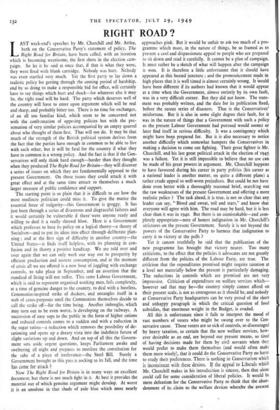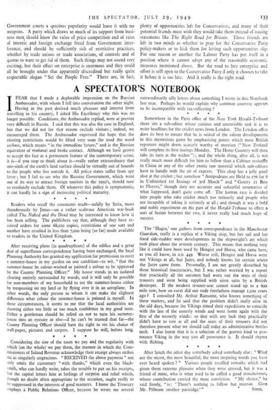RIGHT ROAD?
L.,AST week-end's speeches by Mr. Churchill and Mr. Attlee, both on the Conservative Party's statement of policy, The Right Road for Britain, have been called, with an iteration which is becoming wearisome, the first shots in the election cam- paign. So let it be said at once that, if that is what they were, they were fired with blank cartridge. Nobody was hurt. Nobody was even startled very much. Yet the first party to lay down a realistic policy for getting through the coming period of hardship, and by so doing to make a responsible bid for office, will certainly have to say things which hurt and shock—for whatever else it may be, the right road will be hard. The party which deserves well of the country will have to enter upon argument which will be real and sharp, and probably bitter too. There is no time for exchanges, of an all too familiar kind, which seem to be concerned not with the confrontation of opposing policies but with the pre- sentation of very similar policies accompanied by an empty quarrel about who thought of them first. That will not do. It may be that much of the strength of the British political system derives from the fact that the parties have enough in common to be able to live with each other, but it will be fatal for the country if what they have in common is a wrong policy. And the fact is that if the Con- servatives will only think hard enough—harder than they thought when they produced The Right Road for Britain—they will discover a series of issues on which they are fundamentally opposed to the present Government. On those issues they could attack it with great effect and at the same time attract to themselves a much larger measure of public confidence and support.
The starting point is so plain that it is difficult to see how the most mediocre politician could miss it. To give the matter the essential force of vulgarity—this Government is groggy. It has just been through a series of disastrous and disgraceful failures and It would certainly be vulnerable if there-were anyone ready and willing to deal it a really shrewd blow. Here is a Government which professes to base its policy on a logical theory—a theory of Socialism—and to put its ideas into effect through deliberate plan- ning; and at the first sign of difficulty in another country—the United States—it finds itself helpless, with its planning in con- fusion and its theory a positive handicap. We are told over and over again that we can only work our way out to prosperity by effrcient production and austere consumption, and at the moment of crisis all we are offered is a new bout of juggling with exchange controls, to take place in September, and an assertion that the standard of living will not suffer. This same Labour Government, which is said to represent organised working men, fails completely, at a rime of genuine danger to the country, to deal with a baseless, Communist-inspired strike of dockers, and entangles itself in a web of cross-purposes until the Communists themselves decide to call the strike off—for the time being. Another imbroglio, which may turn out to be even worse, is developing on the railways. A succession of easy sops to the public in the form of higher rations and reduced controls comes to a sudden end with a reduction in the sugar ration—a reduction which removes the possibility of de- rationing and opens up a dreary vista into the indefinite future of slight variations up and down. And on top of all this the Govern- ment sets aside urgent questions, keeps Parliament awake and sweltering all night and prepares to mutilate the constitution for the sake of a piece of irrelevance—the Steel Bill. Surely a Government brought to this pass is rocking to its fall, and the time has come for attack ?
Now The Right Road for Britain is in many ways an excellent document, but there is not much fight in it. At best it provides the material out of which genuine argument might develop. At worst it is an anodyne in that shade of pale blue which most nearly approaches pink. But it would be unfair to ask too much of a pro- gramme which must, in the nature of things, be so framed as to present a cool and dispassionate appeal to people who are prepared to sit down and read it carefully. It cannot be a plan of campaign. It must rather be a sketch of what will happen after the campaign is won. It is therefore a little unfortunate that it should have appeared at this heated juncture ; and the pronouncement made in high places that it is well timed is almost certainly wrong. It would have been different if its authors had known that it would appear at a time when the Government, almost entirely by its own fault, was in a very difficult corner. But they did not know. The state- ment was probably written, and the date for its publication fixed, before the recent series of disasters. That is the Conservatives' misfortune. But it is also in some slight degree their fault, for it was in the nature of things that a Government with such a policy as the present Labour Government had pursued would sooner or later find itself in serious difficulty. It was a contingency which might have beep prepared for. But it is also necessary to notice another difficulty which somewhat hampers the Conservatives in making a decision to come out fighting. Their great fighter is Mr. Churchill, and his last great political attack in the election of 1945 was a failure. Yet it is still impossible to believe that no use can be made of his great powers in argument. Mr. Churchill happens to have favoured during his career in party politics (his career as a national leader is another matter, on quite a different plane) a rather crude appeal to well-worn prejudices. But could he not have done even better with a thoroughly reasoned brief, searching out the raw weaknesses of the present Government and offering a more realistic policy ? The task ahead, it is true, is not so clear that any leader can say, "Blood and sweat, toil and tears," and know that everyone will agree with him. The road may be hard, but it is less clear than it was in 1940. But there is an unmistakable—and com- pletely appropriate—note of honest indignation in Mr. Churchill's strictures on the present Government. Surely it is not beyond the powers of the Conservative Party to harness that indignation to carry it to victory at the polls ?
Yet it cannot truthfully be said that the publication of the new programme has brought that victory nearer. Too many criticisms, to the effect that the policies it advocates are not greatly different from the policies of the Labour Party, are true. The criticism that the expenditures promised might require taxation at a level not materially below the present is particularly damaging. The reductions in controls which are promised are not very impressive. Criticism of expenditure on welfare services which— however sad that may be—the country simply cannot afford on their present scale, is not as courageous as it should be, and nobody at Conservative Party headquarters can be very proud of the short and unhappy paragraph in which the critical question of food subsidies, that enormous weight in the Budget, is evaded.
All this is unfortunate since it fails to interpret the mood of vast numbers of voters who might be swung over to the Con- servative cause. Those voters are so sick of controls, so discouraged by heavy taxation, so certain that the new welfare services, how- ever desirable as an end, are beyond our present means, so tired of having decisions made for them by civil servants when they would prefer to make them themselves (and would often make them more wisely), that it could do the Conservative Party no harm to study their preferences. There is nothing in Conservatism which is inconsistent with these desires. If the appeal to Liberals which Mr. Churchill makes in his introduction is sincere, then that alone could call for some consideration of liberal policies. It would be mere defeatism for the Conservative Party to think that the aban- donment of its-claim to the welfare devices whercbv the present Government courts a specious popularity would leave it with no weapons. A party which draws so much of its support from busi- ness men should know the value of price competition and of rates of interest and foreign exchange freed from Government inter- ference, and should be sufficiently sick of restrictive practices, whether by trade unions or trade associations, of controls and of quotas to want to get rid of them. Such things may not sound very exciting, but their effect on enterprise is enormous and they could all be brought under that apparently discredited but really quite respectable slogan "Set the People Free." There are, in fact, plenty of opportunities left for Conservatives, and many of their potential fr;ends must wish they would take them instead of issuing statements like The Right Road for Britain. Those friends are left in two minds as whether to pray for the Conservative Party policy-makers or to kick them for letting such opportunities slip. For one reason or another the Labour Party has put itself in a position where it cannot adopt any of the reasonable economic measures mentioned above. But the road to free enterprise and effort is still open to the Conservative Party if only it chooses to take it before it is too late. And it really is the right road.



































 Previous page
Previous page